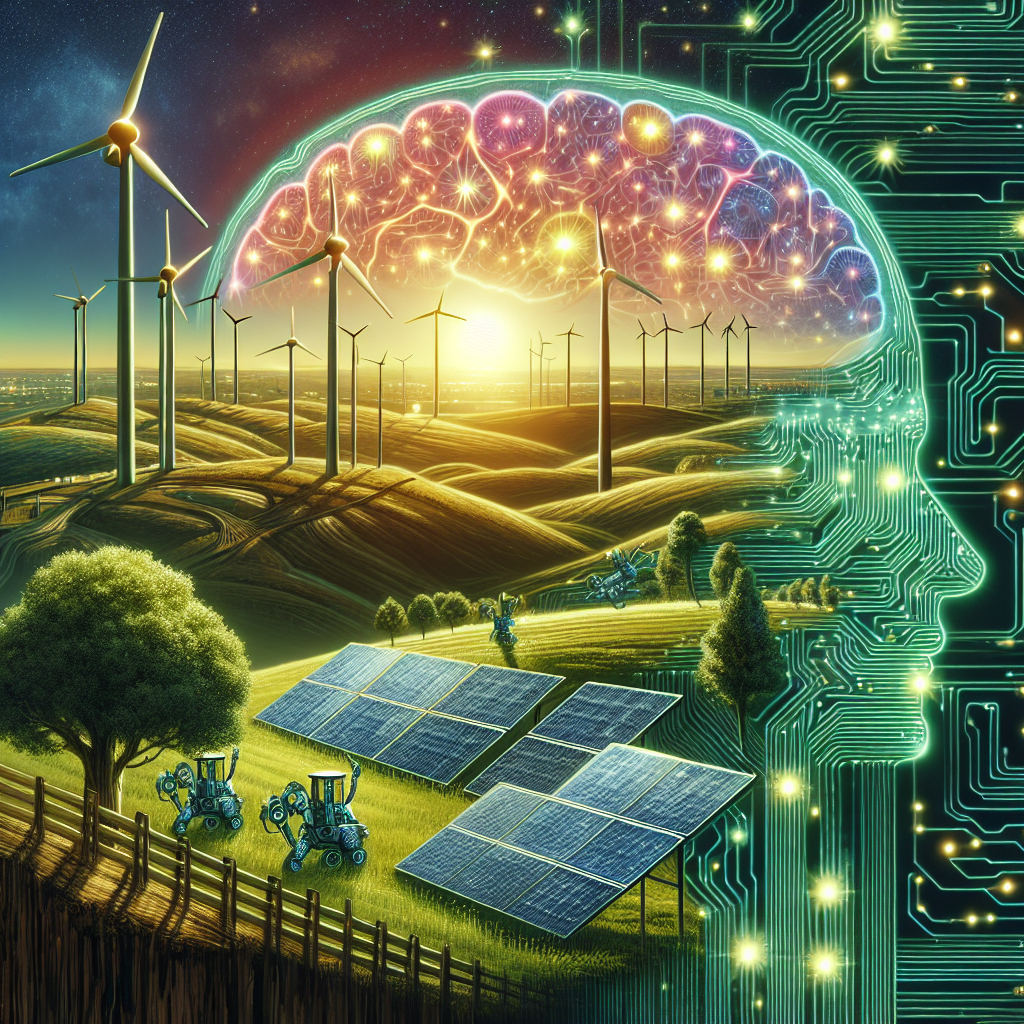As the world continues to grapple with the effects of climate change, the importance of transitioning to renewable energy sources has become increasingly apparent. Renewable energy sources, such as solar and wind power, are crucial in reducing greenhouse gas emissions and mitigating the impacts of climate change. However, optimizing the usage of renewable energy sources can be a complex and challenging task.
Fortunately, advancements in artificial intelligence (AI) technology are revolutionizing the way we manage and optimize renewable energy usage. AI-driven solutions are enabling us to more effectively harness the power of renewable energy sources, increase energy efficiency, and reduce overall energy costs. In this article, we will explore how AI-driven solutions are being used to optimize renewable energy usage and the benefits they offer.
How AI is Optimizing Renewable Energy Usage
AI technologies, such as machine learning and predictive analytics, are being used to optimize the generation, distribution, and consumption of renewable energy. These technologies are able to analyze vast amounts of data in real-time, identify patterns and trends, and make intelligent decisions to optimize energy usage. Here are some ways in which AI is being used to optimize renewable energy usage:
1. Predictive Maintenance: AI-driven solutions can analyze data from renewable energy systems, such as solar panels and wind turbines, to predict when maintenance is needed. By identifying potential issues before they occur, AI can help prevent downtime and ensure that renewable energy systems are operating at peak performance.
2. Demand Response: AI technologies can analyze energy consumption patterns and predict peak demand times. By adjusting energy production and consumption in real-time, AI can help utilities optimize energy usage, reduce costs, and minimize the need for fossil fuel-based backup power.
3. Energy Storage Optimization: AI algorithms can optimize the charging and discharging of energy storage systems, such as batteries, to maximize the use of renewable energy. By storing excess energy when it is abundant and discharging it when needed, AI can help balance supply and demand and reduce reliance on traditional energy sources.
4. Smart Grid Management: AI-driven solutions are being used to manage the complexities of modern energy grids. By analyzing real-time data from sensors and devices, AI can optimize the flow of electricity, detect and respond to grid disturbances, and improve overall grid reliability and resilience.
5. Energy Efficiency: AI technologies can analyze energy consumption patterns in buildings and industrial facilities to identify opportunities for energy savings. By optimizing heating, cooling, lighting, and other energy-intensive processes, AI can help reduce energy waste and lower overall energy costs.
Benefits of AI-Driven Solutions for Optimizing Renewable Energy Usage
The use of AI-driven solutions for optimizing renewable energy usage offers a wide range of benefits, including:
1. Increased Energy Efficiency: By analyzing data and making intelligent decisions in real-time, AI can help optimize energy production, distribution, and consumption, leading to increased energy efficiency and reduced energy waste.
2. Cost Savings: AI-driven solutions can help reduce energy costs by optimizing energy usage, maximizing the use of renewable energy sources, and minimizing the need for expensive fossil fuel-based backup power.
3. Improved Reliability: By predicting and preventing equipment failures, optimizing energy storage, and managing grid disturbances, AI can help improve the reliability and resilience of renewable energy systems.
4. Environmental Benefits: By increasing the use of renewable energy sources and reducing greenhouse gas emissions, AI-driven solutions can help mitigate the impacts of climate change and promote a more sustainable energy future.
5. Enhanced Decision-Making: AI technologies can analyze vast amounts of data and provide valuable insights to help energy managers and policymakers make informed decisions about energy usage, investment, and policy development.
FAQs
Q: How does AI help optimize renewable energy usage?
A: AI technologies, such as machine learning and predictive analytics, can analyze data from renewable energy systems, predict energy consumption patterns, and make intelligent decisions to optimize energy production, distribution, and consumption.
Q: What are some examples of AI-driven solutions for optimizing renewable energy usage?
A: Some examples of AI-driven solutions include predictive maintenance for renewable energy systems, demand response to adjust energy production and consumption in real-time, energy storage optimization to maximize the use of renewable energy, smart grid management to optimize grid operations, and energy efficiency analysis to identify opportunities for energy savings.
Q: What are the benefits of using AI-driven solutions for optimizing renewable energy usage?
A: The benefits of using AI-driven solutions include increased energy efficiency, cost savings, improved reliability, environmental benefits, and enhanced decision-making capabilities.
Q: How can businesses and utilities implement AI-driven solutions for optimizing renewable energy usage?
A: Businesses and utilities can implement AI-driven solutions by partnering with AI technology providers, integrating AI technologies into existing energy systems, and training staff to use AI tools effectively. By leveraging AI technologies, businesses and utilities can optimize renewable energy usage, reduce costs, and promote a more sustainable energy future.
In conclusion, AI-driven solutions are playing a crucial role in optimizing renewable energy usage and promoting a more sustainable energy future. By analyzing data, making intelligent decisions, and optimizing energy production, distribution, and consumption, AI technologies are helping us maximize the use of renewable energy sources, increase energy efficiency, and reduce overall energy costs. As we continue to harness the power of AI, we can expect to see even greater advancements in renewable energy optimization and a more sustainable energy landscape for future generations.

